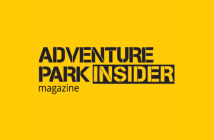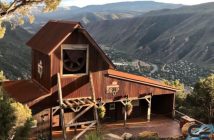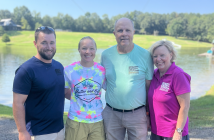The COVID-19 pandemic is upending the definition of “protective gear” for adventure parks, who may see new opportunities—and challenges—as they seek to keep both guests and staff members healthy.
Safety is baked into the culture of aerial adventure operations, of course. That overarching culture isn’t limited to on-course safety, though. It’s also represented in retail offerings. Personal protective products have long found a place beside the souvenirs and energy drinks at park gift shops. Some of those existing products will now become more popular—and different products will be added to the inventory—as guests aim to protect themselves from more than just bugs and sun.
Already Popular Products
Even before the coronavirus pandemic, parks did a reasonably brisk trade in products like sunglasses, sunscreen, lip balm, rain ponchos, and insect repellant to make the hours spent negotiating ropes courses or zip tours in typically rural and wooded environments as comfortable as possible.
“These are basics you should have in your store,” says Rebecca Bleecker of Adventure Suppliers, LLC, which supplies a broad range of protective products to adventure parks and other clients.
Location and climate play a role in what appears on store shelves. “Some are completely in the woods and sell no sunscreen, but do well with bug spray, for example,” says Bleecker.
Sonni Gibson, operations manager of High Gravity Adventures, says that while sunscreen has always been a best-seller at the Blowing Rock, N.C., park, Buff-style neck warmers have also become popular impulse purchases among warm-weather visitors not used to the mountain chill at the park. “Those have proven to be good sellers in cold temperatures,” says Gibson.
Also in the mountains of North Carolina, Asheville Adventure Center reports similar success selling climbing and cold-weather gloves, as well as hand warmers, hoodies, and long-sleeved shirts. “Because we are so far south, our guests include a lot of people from Florida and further south of us,” says owner Jeff Grenier. “It’s not so much they forgot it, it’s just that they don’t have it.”
At some locations, inexpensive footwear flies off the shelves. First Flight Adventure Park on the Outer Banks of North Carolina, for example, does a brisk business selling closed-toe shoes, which are required on its aerial course. “People are at the beach and the only thing they are wearing is flip-flops,” says Matt Marcus of gear supplier High Country Hardware, which sells a wide variety of gloves and face coverings, along with helmets, harnesses, carabiners, and belay systems.
To Loan or to Sell?
The “new normal” of operating adventure parks in the midst of a pandemic, however, has raised health concerns that make sunburns and mosquito bites seem trivial by comparison. Parks will continue to sell the types of protective products they always have, of course, but suddenly items like masks, gloves, hand sanitizer, and shoes have moved up the priority list on purchase orders.
“We are getting more calls—people are not sure what post-COVID ops look like,” says Marcus.
Footwear. Like First Flight Adventure Park, most ropes courses require participants to wear closed-toe shoes, but it’s not uncommon for guests to arrive wearing inappropriate footwear. “No matter what you do, someone will walk in with sandals,” says Bleecker.
As a result, some parks offer rental shoes, while others sell inexpensive footwear, such as lace-up water shoes, to avoid having to turn customers away. “For $15, you’re not going to screw up your whole day,” says Bleecker. “You’re just going to buy them.”
Gloves. With COVID-19, however, the practice of loaning guests shoes or gloves—the latter required on zip lines with hand braking—could come to an abrupt halt over concerns about the spread of germs. Bleecker says that parks could sell basic gloves for as little as $5, with leather gloves starting at around $15.
“Every time we’ve put these leather gloves in shops, they’ve become the hottest seller in no time,” says Bleecker. She suspects it’s because many people think sharing gloves is gross anyway.
Even if they weren’t popular before, that’s likely to change. “In the past, gloves have not been a huge seller, but now it might be a different time,” says Lee Kerfoot, owner of Kerfoot Canopy Tour and Brainerd Zipline Tour in Minnesota. “Guests can bring their own or they can buy a new pair.”

Trango Grypz Glove from Adventure Suppliers.
Kerfoot says gloves will be sold at “slightly above cost,” but he predicts that any spike in sales could be short-lived. “By the summer of 2021, people won’t care,” he says.
There’s also the option of giving gloves away, in a sense. “I don’t know if we will offer gloves for sale or include them with your zip,” says Jessica Brayman, guest services manager at Gunflint Lodge of Grand Marais, Minn., a destination resort with amenities that include a zip line as well as other outdoor activities. “We probably will opt to build that into the cost.”
Grenier, on the other hand, says Asheville Adventure Center will continue to loan gloves but require guests to use hand sanitizer before and after each use. However, he adds, “I expect we will have increased sales of glove liners.”
Sanitary Situation

Branded hand sanitizers from Adventure Suppliers can come in a variety of packaging for ease of use in different scenarios.
Bleecker says that point-of-sale opportunities in a pandemic could also manifest in unexpected ways, such as selling sanitary table covers for socially distanced dining, perhaps on outdoor picnic tables at or near an aerial adventure operation. Hand sanitizer and masks, on the other hand, are among the items more likely to appear in retail outlets once parks reopen.
“We have hand sanitizer on site and will require guests to use it when they walk in, and if we can get our hands on it to sell, we will,” says Gibson of High Gravity Adventures. Brayman says that hand sanitizer has always been available at Gunflint’s zip line lodge, owing to the fact that it has no running water, adding, “I don’t know if we will sell it as much as provide it.”

Adventure Suppliers is offering several different models of face masks, including cotton unisex masks that can be imprinted with a logo.
Face Covering
The face mask has become the most potent symbol of the coronavirus pandemic and, in many places, required in order to go out in public.
Staff and participant protection. “We will require everyone to wear masks—guests and guides,” says Gibson, who adds that guides will be provided with cotton masks while guests will get disposable medical-style masks, with the cost folded into ticket prices. Gunflint Lodge, likewise, will provide disposable masks for guests.
Kerfoot is opting for transparent face shields for guides. “We think it’s important that guests can see the guides’ faces,” Kerfoot says. Asheville Adventure Center will equip guides with face shields as well as face masks.

New masks being sewn at BlackStrap.
For parks and their suppliers, the transition to operating in a COVID environment is made somewhat easier by the fact that both face shields and masks are already in their supply chain.
“Face shields are really more of an arborist or rescue team product,” says Marcus. “We’ve had them, but never highlighted it.”
Retail potential. While it’s unlikely that parks had a supply of surgical masks on hand prior to the pandemic, many do sell other gear that can be used as masks, such as bandanas and neck gaiters.
Asheville Adventure Center, for example, sells neck warmers alongside a wide range of logo items, including sunglasses and clothing. “We have logoed bandanas and Buffs, and I expect these sales will increase,” says Grenier.
Orders for such items are already rising, according to Jim Sanko, brand manager for BlackStrap, a company that manufactures and sells a variety of face gear, headwear, gloves, and base layers. “We’ve had a huge rise in orders for tube-style and medical masks, including from ski areas that operate adventure parks,” says Sanko. “A number of them are places we do logo stuff for.”
BlackStrap sells its gaiter-style Daily Tube sun masks for $10 each wholesale, and Civil face masks for $8 each wholesale (with a 48-piece minimum order). Custom logos are free with the Daily Tubes, and $2 each for the Civil mask—an apropos branding opportunity nowadays. At press time, for every Civil mask purchased online, BlackStrap is donating one Civil mask to community entities and individuals in need.
As Americans have learned to live with wearing masks in public, basic clinical-style masks are increasingly being replaced by customized items. Bleecker says that’s a trend that park operators should embrace. Adopt “the idea that people are proud that they came to your place.”






